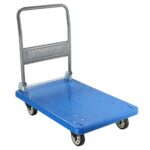In the dynamic landscape of Philippine workplaces, the office table stands as an enduring symbol of productivity, collaboration, and adaptability. From traditional wooden desks to modern ergonomic designs, the evolution of office tables reflects not only changes in workplace culture but also technological advancements and societal shifts. Let’s delve into the significance of office tables in Philippine offices, exploring their evolution and the role they play in shaping contemporary workspaces.
Office Table:
Historically, Philippine offices favored sturdy wooden desks, often crafted from indigenous materials like narra or mahogany. These desks symbolized longevity and stability, mirroring the values embedded in the Filipino work ethics office table. With drawers for storage and ample surface area for paperwork, these traditional office tables served as the cornerstone of productivity in a time when paperwork dominated administrative tasks.
Modernization and Adaptation:
As the country embraced modernization and global trends, office furniture designs evolved to meet the changing needs of workplaces. Steel desks became popular, offering durability and a sleek aesthetic that aligned with contemporary office environments. The rise of multinational corporations and outsourcing firms further influenced office table designs, with modular and customizable options becoming prevalent to accommodate diverse work styles and collaborative settings.
Reception Desk:
In recent years, there has been a growing emphasis on employee well-being and ergonomics in Philippine workplaces. Office tables are no longer merely functional pieces of furniture but are designed with the health and comfort of employees in mind reception desk. Height-adjustable desks, ergonomic chairs, and accessories like monitor arms and keyboard trays are now commonplace, reflecting a shift towards creating healthier work environments that promote productivity and reduce the risk of musculoskeletal disorders.
Flexibility and Mobility:
The advent of remote work and flexible work arrangements has also influenced the design of office tables in the Philippines. Companies are increasingly investing in mobile and adaptable furniture solutions that cater to a workforce that moves between office spaces, home offices, and co-working spaces. Folding tables, lightweight desks on casters, and modular workstations enable employees to set up productive workspaces wherever they go, fostering flexibility and agility in the workplace.
Filing Cabinet:
With growing awareness of environmental issues, there is a rising demand for sustainable office furniture solutions in the Philippines filing cabinet. Office tables made from recycled materials, responsibly sourced wood, and eco-friendly manufacturing processes are gaining popularity among environmentally conscious companies. By opting for sustainable furniture options, businesses in the Philippines are not only reducing their environmental footprint but also demonstrating their commitment to corporate social responsibility.
Cultural Influences:
The Filipino concept of “bayanihan,” or communal unity, is reflected in the design and layout of office spaces, including the choice of office tables. Collaborative work environments are favored, with open-plan layouts and shared workstations encouraging interaction and teamwork among employees. Office tables are often designed to facilitate group discussions, brainstorming sessions, and team meetings, fostering a sense of camaraderie and collective responsibility in the workplace.
Technological Integration:
In the age of digital transformation, office tables in the Philippines are increasingly integrated with technology to support the needs of a digitally savvy workforce. Cable management systems, built-in power outlets, and wireless charging pads are now standard features of modern office tables, enabling employees to stay connected and productive in an increasingly digital workplace office table price philippines. Smart desks equipped with IoT sensors and connectivity options further enhance efficiency and convenience, allowing for seamless integration with other office technologies.
Conclusion:
The evolution of office tables in the Philippines reflects the ever-changing nature of work and the dynamic needs of modern workplaces. From traditional wooden desks to high-tech smart desks, office furniture designs have evolved to meet the demands of a diverse workforce and changing work environments. As companies continue to prioritize employee well-being, sustainability, and technological integration, the role of office tables in shaping productive and collaborative workspaces will remain pivotal in the Philippine corporate landscape. By embracing innovation while honoring cultural values, Philippine workplaces are poised to thrive in an era of rapid change and digital disruption.







